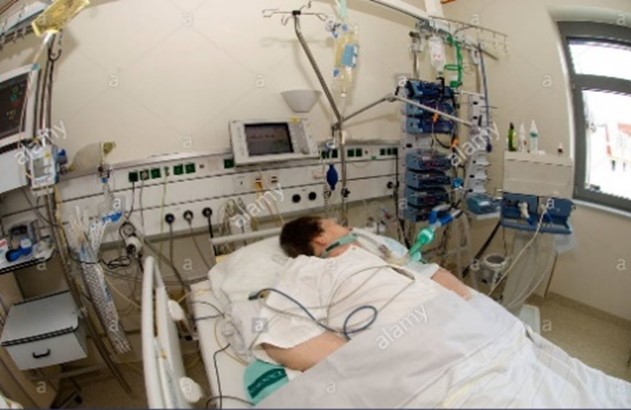Hi, it’s Patrik Hutzel from INTENSIVECAREHOTLINE.COM where we instantly improve the lives for Families of critically ill Patients in Intensive Care, so that you can make informed decisions, have PEACE OF MIND, real power, real control and so that you can influence decision making fast, even if you’re not a doctor or a nurse in Intensive Care!
This is another episode of “YOUR QUESTIONS ANSWERED” and in last week’s episode I answered another question from our readers and the question was
Should I Give Consent to Tracheostomy for My Mom in ICU If Extubation Fails?
You can check out last week’s question by clicking on the link here.
In this week’s episode of “YOUR QUESTIONS ANSWERED” I want to answer questions from one of my clients Lloyd, as part of my 1:1 consulting and advocacy service! Lloyd’s mom is in ICU ventilated, and he is asking if his mom can avoid tracheostomy and percutaneous endoscopic gastrostomy (PEG) and be discharged from ICU.
Can My Mom Avoid Tracheostomy & Percutaneous Endoscopic Gastrostomy (PEG) and Be Discharged from ICU?

“You can also check out previous 1:1 consulting and advocacy sessions with me and Lloyd here.”
Patrik: Hi Lloyd, can you hear me okay?
Lloyd: Yeah, perfectly. Belle and Paul, are you on yet?
Patrik: No, they’re not here yet. Anyway, how’s your mom?
Lloyd: My mom was spiking a fever and so they’re taking cultures. So, if they’re doing that, it’s a possibility that they might not extubate, I guess? If that’s the case, I’m not sure.
Patrik: They might not, but they might also not do a tracheostomy.
Lloyd: Yeah. So I guess, tomorrow is when we’ll find out. But I think Belle was basically, she had a good suggestion. Like what argument can we tell them that we don’t want to do a PEG (Percutaneous Endoscopic Gastrostomy)?
Patrik: You just tell them you don’t want to do a PEG.
Lloyd: What is the rationale?
Patrik: The rationale is that it’s a surgical procedure, and the rationale is that there are patients in ICU with a nasogastric tube for months on end and there’s no issue. I am telling you in all sincerity here, that the PEG, they are pushing for the PEG to send him out. They’re just not telling you.
Lloyd: Okay. Yeah.
RECOMMENDED:
Belle: So, we totally are on board with that. We believe that. I’d just like to have a little ammunition, like a statement that you want to give her a chance for a couple of weeks to prove that she can swallow.
Patrik: Yep.
Belle: That she can regain her swallowing. So, I just want to add some little things to say, sorry, we’re going to say, a little…
Patrik: Yeah, absolutely. And that is definitely part of the argument, but I don’t know whether you’ve seen that I texted you an article? Lloyd?
Lloyd: Oh, yes.
Patrik: Right.
Lloyd: I didn’t have a chance to look at it yet.
Patrik: Yeah. That’s okay. That’s basically talking about the advantages and disadvantages of a PEG. If your mom is in another country, they would keep her in ICU with a nasogastric tube. The PEG is a unique setup to send patients out to LTAC (Long Term Acute Care) as quickly as possible.
Lloyd: Okay.
Belle: So you’re saying there’s no… That they couldn’t point to a study or anything that says that’s the best way, has the best patient outcome to view this operation right away?
Suggested Links:
- YOU DON’T KNOW WHAT YOU DON’T KNOW WHEN YOUR LOVED ONE IS CRITICALLY ILL IN INTENSIVE CARE! (PART 1)
Patrik: Yes. I would argue that probably could point you toward the study in the unique setup of the healthcare context, where patients from ICU go to LTAC, which is not what’s happening in other countries.
Belle: Right.
Patrik: Right? So yes, they probably can.
Belle: Support that.
Patrik: But again, all I can say is, I suggest that you look at reviews of an LTAC or a subacute or a skilled nursing facility in your area and look at the online reviews.
Lloyd: Yeah. And you said that you might have some sort of source here in a nearby place that where we could look into doing at home care?
Patrik: There is a contact of mine in the next city as you’re aware.
Lloyd: Oh, awesome.
Patrik: Right. However, I will say this, so there’s a gentleman in our state, he’s doing similar things to what we are doing here in Melbourne and in Sydney where we are taking patients home with tracheostomy ventilation. The only thing I will say, I have tried to refer clients in the rural area onto him. I don’t think he got the capacity, because I’m hearing, I refer clients in good faith and then I’m hearing from them, well, he’s not getting back to me. So, whilst I can vouch for his expertise, I just don’t think he got the capacity.
Lloyd: Oh, wow. Is it worth just trying to?
Patrik: Of course, it’s worth.
Lloyd: Okay. Then we would be on our own to try to find a place that could probably set us up at home.
Suggested Links:
Patrik: You could try and you will find it very difficult. Again, it’s similar to intensive care, it’s such a highly specialized area. I do believe the best… I’ll paint what I believe is the best case scenario in this. If she can’t be extubated and she needs a trach, well then she needs to be weaned off the ventilator and ideally have the trach removed as well. And then she could go home without a trach, which would be so much better. That I believe is the best case scenario. But unfortunately, from my experience, it’s been two weeks now or even less than two weeks. It’s so hard to look into the future in those circumstances.
Belle: And they send them home with the feeding tube in the nose?
Patrik: No. You see, as much as they only take patients in a LTAC with a PEG tube, sending patients home with a nasogastric tube is high risk, because if the nasogastric tube came out at home, she probably would need to be readmitted back to hospital.
Belle: Okay. Yeah, that would not be good. Okay.
Lloyd: So basically, that would allow her to stay here for a little bit of time.
Patrik: Absolutely.
Lloyd: Okay. But that’s definitely new I mean, you’re aware that, that’s definitely the rule in most hospitals that they can’t discharge you if you don’t have a PEG?
Patrik: Yes, very much so.
Lloyd: Okay. Good. Go ahead, Belle. I’m sorry.
Belle: I just wanted to go over the scenario where she successfully gets extubated tomorrow, but then still goes on to need the trach. We haven’t heard of that playing out like that. Even the doctor didn’t explain it, that could be a possibility. What’s the likelihood of that?
Patrik: Can you repeat that again, please?
Belle: Why would she need it? If the extubation is successful?
Patrik: Yep.
Belle: Why would she need a trach after that?
Patrik: Oh no, she won’t need a trach. If extubation is successful, she won’t need a trach.
Belle: Okay. Not for the swallowing area. I thought it might have to do with the swallowing-
Patrik: No. If she does need a trach, it could be (A), because she can’t breathe, or (B), because she can’t swallow. Those would be the main indications for a trach.
Belle: So it’s got nothing to do with the ventilator. This is just another…
Patrik: No.
Belle: Just a reason to give it.
Patrik: That’s right. The reasoning… So with a trach, there are two indications for a trach. (A), would be inability to wean off the ventilator, because the breathing tube could cause damage in the back of the throat over time. And the other indication would be that she can’t swallow, but she might be able to breathe. But if she can’t swallow and her saliva goes into the lungs, then she’d develop an aspiration pneumonia and then she’ll be back on a ventilator.
Belle: They’ll determine that right away. As soon as the trach comes out, they can determine whether she’s swallowing or whether that’s going to happen, whether you’re going get pneumonia from the saliva.
Patrik: Exactly.
Belle: True. Okay.
Patrik: Yeah. Definitely.
Belle: And they’re the ones that, that’s when we would find out about the trach for the swallowing, pretty soon after the extubation then?
Patrik: Very much so.
Belle: It wouldn’t be a big one.
Patrik: Very much so.
Suggested Links:
Belle: Yeah. The doctor didn’t really explain that.
Patrik: Right.
Belle: Extubation means no trach, but that’s not true. That’s new to me now.
Patrik: Right.
Belle: That’s good to know.
Patrik: Right.
Lloyd: So in that case, would they have to reintubate him?
Patrik: Yes. So, let’s just say she fails another extubation. They can’t go to the trach straight away. They would need to reintubate her and then do a trach.
Lloyd: Okay. So, she’s going to have to, and that causes more risk.
Patrik: Look, again, extubation needs to happen in a sort of time limited window of opportunity. It’s got to be timed really well. You wouldn’t necessarily do it. And maybe they’ve done that when on last extubation, you would ideally do it in the morning when people are around. You wouldn’t necessarily do it at six o’clock at night or eight o’clock at night when there’s less staff. It’s almost like you have to time it really well, especially for vulnerable patients. I mean, there might be someone post-surgery, a young patient, you might be able to do it at 10 o’clock at night. But for vulnerable patients, you really need to time it well that you can manage anything that comes your way without necessarily reintubating. Do you know the time when they extubated your mom?
Lloyd: I don’t remember, actually. I’m just, my mind is just jello right now.
Patrik: Yeah, sure.
Lloyd: I think it was on the earlier side. No, it was in the afternoon. I think it was, because at four o’clock she was belly breathing and I think she was on it for like 14 hours maybe before she started belly breathing.
Patrik: Right.
Lloyd: So, if it was, maybe it was around 2:00, I’m thinking. 12:00 to 2:00, I guess, in the afternoon.
Patrik: Right.
Suggested Links:
Lloyd: 4:00. Or maybe it was even after. Yeah, I mean it’s probably around two o’clock. Yeah, I think it was early. Oh yeah, that’s right. It was, yeah, it was like two o’clock I would think.
Patrik: Two o’clock, okay, not too bad. Not too bad.
Lloyd: So I guess tomorrow if they come and-
Belle: I’m confused as to how we’re proceeding tomorrow. We just let the doctors determine it? Or do we have any say in it?
Patrik: Oh you do. If you don’t give consent to a trach, nothing will happen.
Belle: Not the trach, just the extubation. I’m confused now about proceeding with the extubation.
Patrik: Right. Do you think they want to push for extubation tomorrow?
Lloyd: I’m feeling so…
Belle: Well, I was surprised that the doctor came around. In the back of my mind, we’re thinking maybe he’s just doing this extubation knowing it will fail just to get us off his back and we can go ahead with the trach. I don’t want to believe that. And the way he turned around from questioning whether it was going to be successful the first day and now the second day saying, look, we’re going to give it a shot. This was surprising to me.
Patrik: Right. I have two thoughts. So again, the missing link to me is the arterial blood gas. That’s the missing link to me.
Lloyd: The respiratory therapist went in and we asked her for it. She said, I can’t give it to you.
Patrik: Really?
Suggested Links:
Lloyd: But then she said to, yeah, she was like, “Don’t worry about it. We’re worrying about this part of things. You don’t have to worry about it. Just get some sleep tonight. And she needs to get some sleep tomorrow morning.” She was saying that the blood gases tonight would be different from the blood gases tomorrow morning.
Patrik: Interesting. Is that because they are potentially changing the ventilator settings overnight?
Lloyd: She said that right now everything looks good. And she said if things change, I guess if her breathing becomes different, then they would come in. They might rest her tonight or something. But from what I was told by the doctor, they were going to leave her. I don’t know if they’re going to change her settings, but they were going to let her breathe on her own and not rest her lungs tonight. So I mean probably with the pressure support with whatever it is there now, they were going to leave it like that.
Patrik: It’s pressure support.
Lloyd: Yeah.
Patrik: Okay.
Lloyd: But she’s doing all the breathing on her own.
Patrik: Yeah, no, I get that. No, I can confirm that. But it’s interesting that they say that blood gases tomorrow morning will be different than they are now.
Lloyd: Yeah, that’s what she says.
Patrik: Unless they’ve done-
Lloyd: Is that your assessment? What are your thoughts on that?
RECOMMENDED:
Patrik: I’ll tell you what my thoughts on that are. So they would’ve done a blood gas. After the blood gas, they might have changed the ventilator settings, either decreased or increased support, and they haven’t done a blood gas since. So yes, if they did that, if they changed the ventilator settings after the last blood gas, you would think that the next blood gas would be different.
Lloyd: But we don’t know if they did, because I asked them if they were taking the blood gas tonight when they were taking the blood? And they said that no, they’re just, whenever patients have a fever spikes, they do like the blood culture. So they weren’t telling me that they were going to take blood gas tonight. But you were saying that’s something that they would have to, I don’t know. They get it from, they have to draw blood in order-
Patrik: They would.
Lloyd: Test it, right?
Patrik: Yes, they would.
The 1:1 consulting session will continue in next week’s episode.
How can you become the best advocate for your critically ill loved one, make informed decisions, get peace of mind, control, power and influence quickly, whilst your loved one is critically ill in Intensive Care?
You get to that all important feeling of making informed decisions, get PEACE OF MIND, CONTROL, POWER AND INFLUENCE when you download your FREE “INSTANT IMPACT” report NOW by entering your email below!
In Your FREE “INSTANT IMPACT” report you’ll learn quickly how to make informed decisions, get PEACE OF MIND, real power and real control and how you can influence decision making fast, whilst your loved one is critically ill in Intensive Care! Your FREE “INSTANT IMPACT” Report gives you in-depth insight that you must know whilst your loved one is critically ill or is even dying in Intensive Care!
Sign up and download your FREE “INSTANT IMPACT” REPORT now by entering your email below! In your FREE “INSTANT IMPACT” REPORT you’ll learn how to speak the “secret” Intensive Care language so that the doctors and the nurses know straight away that you are an insider and that you know and understand what’s really happening in Intensive Care! In your FREE report you’ll also discover
- How to ask the doctors and the nurses the right questions
- Discover the many competing interests in Intensive Care and how your critically ill loved one’s treatment may depend on those competing interests
- How to Eliminate fear, frustration, stress, struggle and vulnerability even if your loved one is dying
- 5 mind blowing tips & strategies helping you to get on the right path to making informed decisions, get PEACE OF MIND, control, power and influence in your situation
- You’ll get real world examples that you can easily adapt to you and your critically ill loved one’s situation
- How to stop being intimidated by the Intensive Care team and how you will be seen as equals
- You’ll get crucial ‘behind the scenes’ insight so that you know and understand what is really happening in Intensive Care
- How you need to manage doctors and nurses in Intensive Care (it’s not what you think)
Thank you for tuning into this week’s YOUR QUESTIONS ANSWERED episode and I’ll see you again in another update next week!
Make sure you also check out our “blog” section for more tips and strategies or send me an email to [email protected] with your questions!
Also, have a look at our membership site INTENSIVECARESUPPORT.ORG for families of critically ill Patients in Intensive Care here.
Or you can call us! Find phone numbers on our contact tab.
If you want a medical record review, please click on the link here.
Also check out our Ebook section where you get more Ebooks, Videos and Audio recordings and where you can also get 1:1 counselling/consulting with me via Skype, over the phone or via email by clicking on the products tab!
This is Patrik Hutzel from INTENSIVECAREHOTLINE.COM and I’ll see you again next week with another update!







